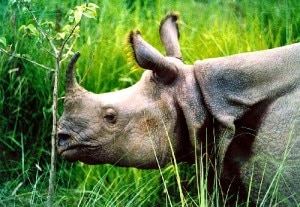Rhino-range nations in pact to anti-poaching operations

KATHMANDU, Nepal-The five rhino range nations from South Asia have nodded to a common action plan to improve the biological management and monitoring of the species, performing strict anti-poaching operations and strengthening the protection of their habitats.
The two-day Asian Rhino Range States Meeting held in Bandar Lampung, Indonesia, agreed to introduce tougher penalties for those that illegally kill Asian rhinos, and maintaining the ban in the international trade of all rhino products.
The participant nations also agreed to work towards outlining conservation actions necessary to insure a continuous growth rate of all three Asian rhino species—Sumatran, Javan and Greater One-horned, the IUCN Nepal stated.
The Asian Rhino Specialist Group of the International Union for Conservation of Nature (IUCN) from Nepal, Bhutan, India, Indonesia and Malayasia took part the meeting. Nepal is home to the one-horned rhino.
The agreement, called the Bandar Lampung Declaration, was reached after two days of negotiations.
The meet was hosted by the government of Indonesia and facilitated by the IUCN Species Survival Commission.
In order to achieve the goal of increasing the populations by at least three percent each year, the parties have also agreed to increase the Asian species by at least three percent annually by 2020.
The statement added that the pressure from illegal hunting on all species of rhinos has grown seriously in recent years, mainly due to a significant increase in non-traditional use of rhino horn and a rise in rhino horn trade in Asian markets, especially in Vietnam and China.
The Sumatran Rhino (Dicerorhinus sumatrensis) is listed as critically endangered on the IUCN red list of threatened species and its total population could be fewer than 100.
Similarly, an estimated 50 individuals of the Javan Rhino (Rhinoceros sondaicus), also listed as critically endangered, survive in Java’s Ujung Kulon National Park while the greater one-horned rhino (Rhinoceros unicornis), with an estimated 3,339 population mainly in India and Nepal, is listed as vulnerable.

